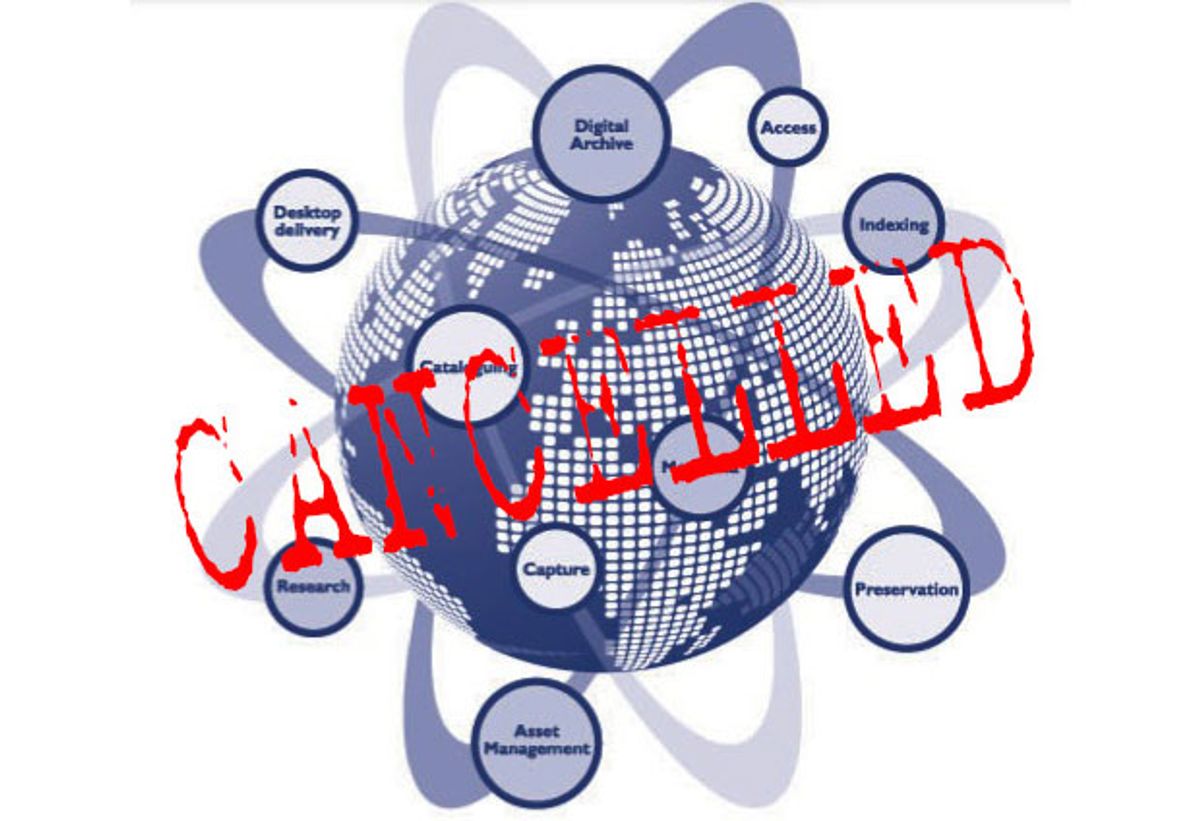The announcement last week that the BBC pulled the plug on its overly ambitious and admittedly poorly managed Digital Media Initiative (DMI), probably drew a smile from the folks who originally worked for Siemens Information Solutions and Services (SIS) group, now owned by ATOS. The BBC admitted that the project, which was said by BBC Trust's Anthony Fry to have created “little or no assets,” cost license fee holders £98.4 million (about US $150 million at current exchange rates).
To understand the former Siemen’s workers presumptive glee, you need to go back a few years.
In February 2008, the BBC directly awarded a £79 million, fix-priced contract to Siemens under an existing outsourcing contract to implement, roll out, and operate through March 2015 what the BBC called its Digital Media Initiative. According to a 2011 National Audit Office (NAO) review, “DMI is a technology transformation project designed to allow BBC staff to develop, create, share, and manage [all] video and audio content and programming on their desktop, and intended to improve production efficiency across the BBC,” anywhere the BBC operated. In other words, DMI was meant to radically change the way the BBC operated internally.
The BBC's business case put the total DMI project investment, including its management and other administrative costs, at £81.7 million, and claimed that the project would end up generating a total benefit of £99.6 million. The benefit, the NAO indicated, would come from reduced operating costs, the avoidance of some future production costs, and a “creative dividend” savings that would accrue from being able to reuse material instead of having to produce entirely new content.
Siemens was on the hook to deliver all technology required for roll-out to BBC business units by May 2009, with an initial delivery by November 2008. However, by February 2008, one month into the contract, the effort was already starting to slip as it became clear that the November 2008 initial delivery was more likely going to end up being February 2009.
But by February 2009, Siemens still had nothing to deliver, and by May 2009, it was obvious that the BBC would probably need to contractually cancel the project with Siemens, which seemed to the NAO to be in over its head. The NAO report indicates that over the next several months, both sides jockeyed over how to blame the other for the project's delay.
In September 2009, the DMI contract to Siemens was canceled by mutual agreement with an effective date of 31 July 2009. The settlement, along with some creative cost accounting allowed the BBC to claim that it had effectively recouped £27.5 million from Siemens.
The BBC then took over the project itself, claiming it could handle it; however, now the DMI project was 21 months behind schedule which would change the project's value for money proposition. In November 2009, a new business case for DMI was submitted to the BBC Finance Committee which indicated that the project investment was now going to be some £105.1 million, and the benefit was going to only be £74.1 million because of the delay in rolling out the project, the NAO report stated. The Finance Committee rejected the business case because it didn’t believe that the benefits as identified could be secured.
In June 2010, a new DMI business plan was submitted to the Finance Committee which now indicated the investment required would be £133.6 million (minus the £27.5 million settlement from Siemens), or £106.1 million in total. The benefits were now said by the BBC to be £97.9 million. To achieve the increased benefits created, instead of rolling out DMI to 6 BBC business units as originally, it would need to be rolled out to 13. The new final completion project date was slipped from March 2015 to March 2017, as well.
Even though the Finance Committee was skeptical of the new benefits calculation (believing them still to be optimistic), this time it grudgingly approved the DMI business case.
By September 2010, the Finance Committee was probably having second thoughts, for the DMI project quickly slipped its schedule another five months; the estimated benefits to be achieved dropped to some £95.4 million, too. The NAO estimated that the expected project costs now exceeded benefits by some £38.2 million.
In February 2011, the NAO formally published its review of the DMI project. Amyas Morse, head of the National Audit Office, stated that the “early stages of this Programme was disappointing and did not achieve value for money. However, since taking the Programme back in house, delivery of the system has progressed well, and users have responded positively. The real test of value for money of the Programme as a whole will be the take up by users across the BBC and elsewhere, and on this it is too early to conclude.”
When the NAO report was released, BBC Trustee Fry was definitely upbeat about DMI's eventual success. He stated that while “the early phase of the project ran into significant difficulties… the BBC reacted with speed and efficiency and since bringing it in-house, delivery is progressing as planned.” The BBC told the NAO that the roll out of the DMI technology would occur during the summer of 2011, which if true, would indicate that the project was indeed getting back on track.
Yet, apparently, the “delivery of the system” didn’t progress very well at all. In October 2012, the BBC’s Director of Operations Dominic Coles quietly paused the DMI development in order to do a reassessment of whether the project still met BBC business objectives. According to Coles, the DMI technology being rolled out to the BBC business units had “proved far more challenging than expected.” For example, much of the technology scheduled to be delivered in the summer of 2011 wasn’t in fact delivered until early 2012, and when it was, users were very unhappy with it, calling it “clunky” and needing redesign, according to the Guardian. Needless to say, the late roll out created additional project costs and delays to the schedule, not to mention a further erosion of the project's benefits.
Adding a wildcard into the mix was that commercial off-the-shelf technology was appearing that could perform most of what the DMI was intended to do and at significantly lower cost. The Guardian article noted just a few months ago BBC Sports was planning to get its own DMI capability from outside suppliers, but at a cost of only £500 000. BBC’s homegrown technology, which looked state of the art in 2007, was likely going to be hopelessly obsolete by the time it was finally delivered as well as terribly expensive to operate or later improve.
So, after reviewing last fall's assessment, the new BBC Director General Tony Hall quickly decided last week that rather than to continue to throw good money after bad, it was time to cancel the “ambitious project” and accept a “total cost” hit of £98.4 million. Lord Hall grimly concluded that, “The DMI project has wasted a huge amount of license fee payers' money and I saw no reason to allow that to continue which is why I have closed it.”
Lord Hall also said that, “We will be looking into what has happened and will take appropriate action, disciplinary or otherwise.”
Even before looking, Lord Hall immediately suspended (with pay) the BBC’s Chief Technology Officer John Linwood, who oversaw the DMI effort. He made Coles the acting CTO. I expect Linwood to resign in the not too distant future, assuming he isn't let go.
MP Margaret Hodge, chair of the House of Commons Public Accounts Committee called the cancellation, “a terrible shock and clearly completely shambolic,” a BBC News story said.
Shambolic certainly, but given the project’s dismal history, it can hardly be said to be a shock. More shocking was why the project wasn’t canned by the BBC Finance Committee back in 2010 or in late 2011 when cost and schedule had to be climbing again, and the business case was rapidly unraveling once more. Group optimism (or hope) apparently outweighed hard-nosed business sense.
One of the project governance controls put into place as a way to keep future projects from crash and burning, the BBC told the NAO during its DMI review, was that “BBC’s investment policy states that business cases must return to the Finance Committee for additional approval if the costs or benefits over the whole life of the project change by the lower of £1 million or 10 percent.” However, I can’t find any mention of a new business case being submitted to the BBC Finance Committee for DMI after the last one in 2010. Given the ongoing problems on the project, I would have half-expected a new business case to have had to have been submitted almost weekly.
If a new business case wasn’t indeed submitted as required, shame on the DMI project manager and senior BBC leadership for ignoring the need for one. If a new case was submitted, and the Finance Committee continued to approve it, shame on the Finance Committee.
Hopefully the “lessons learned” report that is to be conducted into the fiasco will shed light on whether proper BBC project governance controls were followed or willfully ignored.
It will now be interesting to see whether Lord Hall decides that it is time to poison the BBC’s ambitious but still inoperable Socrates (Open source, Collection, Reversioning, Archiving, Tailored, Export, System) foreign language to English computer translation system that is six years late and counting. Siemens is probably thrilled it wasn't offered that project.
Photo: BBC
Robert N. Charette is a Contributing Editor to IEEE Spectrum and an acknowledged international authority on information technology and systems risk management. A self-described “risk ecologist,” he is interested in the intersections of business, political, technological, and societal risks. Charette is an award-winning author of multiple books and numerous articles on the subjects of risk management, project and program management, innovation, and entrepreneurship. A Life Senior Member of the IEEE, Charette was a recipient of the IEEE Computer Society’s Golden Core Award in 2008.



